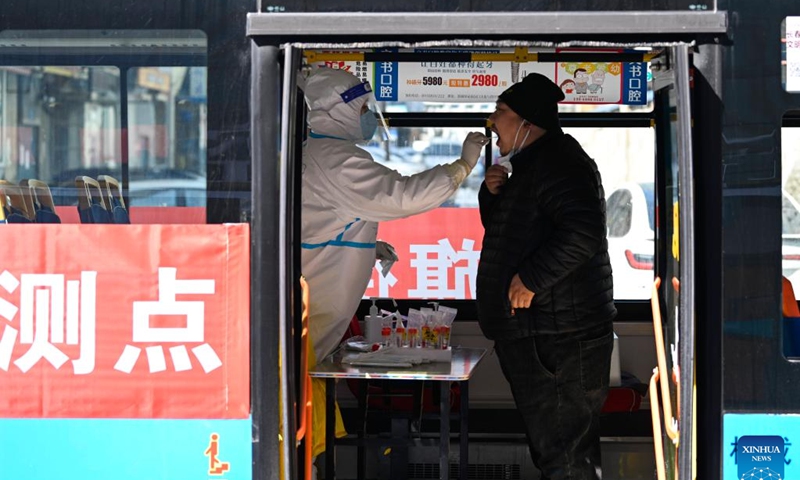China strives to win long-term battle against virus with more targeted measures

A citizen receives nucleic acid test on a bus used as a temporary testing site in Changchun, northeast China's Jilin Province, March 20, 2022. Photo:Xinhua
The daily tally of COVID-19 cases in China remained high over the weekend, with 3,803 infections being reported in the Chinese mainland on Sunday, involving 21 provincial-level localities.
The Omicron-dominated resurgence remains complicated and the battle against the virus is expected to be a long-term one, and experts believed local governments will adjust their measures to become more targeted in a bid to maintain a balance between epidemic control and normal life.
Observers also expressed belief in China's economy amid expressions of doubt. They said the control measures will have just a short-term impact but will not shake China's economic fundamentals in the long run, in contrast to some Western media claims that the epidemic control policy will push cash-strapped local governments to the brink.
In addition to the case tally remaining at a high level, an official from the National Health Commission (NHC) concluded that China's domestic COVID-19 situation is still developing, and epidemic control remains "grim and complex."
An official from the Chinese Center for Disease Control and Prevention (Chinese CDC) who requested anonymity told the Global Times on Sunday that it is not surprising that sporadic cases are being reported in more Chinese cities.
The recent outbreaks across the country cannot be controlled in the way the country has adopted to guard against imported cases, as inter-provincial and inter-city exchanges cannot withstand weeks of quarantine like those imposed for arrivals from overseas, the official said, noting the control measures should be implemented in a more precise way to minimize the impact on people's lives.
Shanghai-based infectious disease expert Zhang Wenhong also stressed at a Sunday forum the need for a precise method of virus prevention and control.
Huge challenges are ahead of us, but we are closer to success in the fight against the epidemic as long as we can further increase the vaccination rate for the elderly, build up better COVID-19 drug reserves and ensure sufficient medical resources, Zhang said.
Among the locally transmitted infections reported on Sunday, Northeast China's Jilin Provincereported the highest of 1,494 positive cases. Though the number of confirmed cases has been decreasing for three days, the epidemic situation is still severe, local authorities said at Sunday's press conference.
Langfang, a city in Hebei Province bordering Beijing, registered the highest number of positive cases after Jilin, with 534 asymptomatic cases and 12 confirmed cases being reported on Sunday, and pressure on the coordinated prevention and control measures in the Beijing-Tianjin-Hebei regionhas been mounting.
Tangshan, another Hebei city that is dubbed China's steel industry hub, on Saturday reported its first local outbreak since March 2020, registering seven confirmed cases in total as of Sunday. In order to quell the outbreak in a timely manner, the city rolled out mass testing and imposed traffic restrictions on all streets starting Sunday, except highways.
Noting that the epidemic control situation is complex, arduous and enduring, Chinese Vice Premier Sun Chunlan stressed at a national teleconference Saturday that all those that need to be hospitalized or isolated should be done so to completely stamp out all community infections.
Regarding the reality that some people have grown weary of the long-term fight against COVID-19, Wu Zunyou, a top epidemiologist with the Chinese CDC, called on the public to adjust their mind-set and fully support the normalized epidemic prevention and control measures. "COVID-19 won't disappear in the short term and our fight [against the COVID-19] will be a long-term battle," Wu said.
Target to be achieved
As China beefs up its efforts to rein in the Omicron strain, many overseas media outlets and institutions have cited the situation to express pessimism over China's economic prospects, claiming that the coronavirus control measures will bring disastrous harm to China's economic sectors ranging from finance to consumption.
Economists interviewed by the Global Times acknowledge that the recent wave of coronavirus outbreaks will bring downward pressure on the growth for the short term, but they don't agree with the Western media view that the extent of damage to China's economy in 2022 brought about by this round of coronavirus resurgence will be immense.
One of the latest concerns raised by Western media is that China's zero-COVID-19 policy is pushing cash-strapped local governments to the brink. "This is a misunderstanding of China's system," Hu Qimu, chief research fellow at the Sinosteel Economic Research Institute, told the Global Times. "Local governments are implementing the central government's general coronavirus restrictive policies. For regions that have a weak financial basis, the central government will either allocate funds directly or deploy other provinces to give financial support, to help them weather the crisis."
Hu mentioned that China did not issue bonds to help fight the pandemic as it did in 2020, more proof that China's general finances are sufficient to cover the expenses for fighting coronavirus.
Both Hu and some other economists said that in general, the recent outbreaks will have a negative impact on China's short-term economic prospects, primarily in consumption and manufacturing in certain affected areas after people and factories are compelled to halt work and production for some time to take nucleic acid tests.
For example, data by domestic bulky commodity information and trading service provider Fubao showed recently that in Tangshan, just 200 kilometers away from Beijing, many steel companies are having their holidays ahead of time due to coronavirus restrictive measures and falling orders, as non-local downstream companies don't dare to make purchases right now.
However, they think that this short-term trend will not shake China's economic fundamentals for the whole year, as those sectors will rebound quickly as soon as the latest round of outbreaks is brought under control, as had been the case in the past two years.
"Once the coronavirus in under control, China's manufacturing and consumption sectors will usher in another round of 'retaliatory rebound,'" Hu said, noting this is very likely to happen unless there's a drastic wave of bankruptcies over the next few weeks.
Another reason the economists cited is that China still has abundant policy reserves to bolster the economy if the economic pressure gets too high.
"China has not used many of its monetary stimulation tools so far this year. If the economy slows too much in the first or second quarter, China may roll out monetary policies, such as reserve requirement ratio cuts starting from the third quarter to stimulate economic growth," Hu said.
Some overseas analysts also held the view that China's economic base is strong enough to handle a short-term crisis, although they do worry about the impact of the Ukraine crisis on the global economy, including China's.
"The Chinese economy's fundamentals are very solid, the exchange rate of the yuan makes it very competitive and it is still grabbing trading market shares around the world while boosting the internal market through the 'dual circulation' policies," Angelo Giuliano, a Hong Kong-based financial and political analyst from Switzerland, told the Global Times on Saturday, adding that if the Russia-Ukraine conflict escalates, it will lead to a major global crisis with a deep recession, especially in the EU, which would also impact Chinese and global growth.
According to Hu, some overseas media or institutions may be exaggerating China's economic difficulties to frighten overseas capital away from the world's No.2 economy, otherwise the US Federal Reserve's interest rate rise would not achieve its desired effects.
Photos
Related Stories
Copyright © 2022 People's Daily Online. All Rights Reserved.










